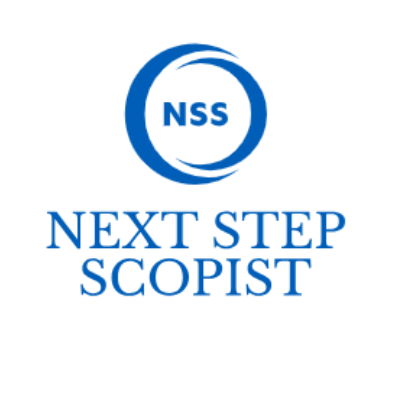November 2nd, 2023 – How To Consistently Improve Your Scopistry Skills

As a person with anxiety, I find it is always in the back of my mind that I need to be better at what I do. My skills better be sharp. I need to constantly keep myself up to date on the latest technologies, and I need to know everything there is to know about the current language used in the legal system and in casual conversation. The worst thing would be reading through a transcript and finding myself stumped on a word because I didn’t have the knowledge I should have of either the language itself or the legal jargon.
I also don’t want to be working with my equipment, find I need to perform a certain function, and then proceed to spend valuable time looking up in the help guides how to do it. This will be especially irksome if I discover later that the problem I was having was a common one, which was very easily solved by a helpful person from an online forum.
That being said, here are the three strategies I use to continually improve my scopistry skills. These skills can be applied to proofreading or writing!

Read
I can’t stress this enough. Read. It seems like a no-brainer, but you can discover a plethora of new information. I read for two main purposes when it comes to my scopistry skills: language, and information.
It is important to me to keep myself up to date on all the happenings in the news in terms of the legal system. This is the only way that can help me improve my legal knowledge. I follow two main blogs that always give me the information I need.
Law360 Blog
Law360 Blog has what you need to stay current on the legal news. It follows active lawsuits and trials in order to maintain a steady flow of information. A few minutes per day can keep you updated on the legal news. This is an invaluable addition for anyone in scopistry.
SCOTUS Blog
This will keep you updated on what is happening in the Supreme Court. This provides a few potential benefits. It gives you access to legal jargon for a start. Also, if any of the court cases here are mentioned in the cases you are transcribing for, you’ll already know how to properly spell the words and phrases.
When I read for language, I tend to choose academic topics that interest me and focus there. If you’re not enjoying yourself when you’re reading, you’re less likely to continue doing it or understand what you do read. This will do nothing towards improving your skills.
I have the kindle app, so I read books there which allows me to define words I don’t know with a quick click. I also like to use Google Scholar to read newly published papers in my fields of interest (Linguistics, Sociology, Anthropology, and Political Science.) Reading both academic papers as well as books for your leisure will assist in increasing your vocabulary. Your witnesses won’t always speak in academic vocabulary, but your lawyers might, and you’ll want that knowledge in your scopistry.

Play with your scopistry equipment
One of the first things I did when I bought Case CATalyst was to press basically every button. I wanted to know what everything did, why it did it, who this was supposed to help, and when I would potentially need it. I made a practice user so I could make as many mistakes as I wanted without potentially ruining my current scopistry work. In the Scoping School, you will find an entire unit dedicated to practice files. These allow you the opportunity to test or improve your skills while also seeing what the buttons you press will do to a transcript. It is risk-free, and it lets you really learn and understand what you’re dealing with.
That being said, I also poured over the Self-Study Guides and the command summary cards located in the Help menu. That information was invaluable for letting me understand the equipment better.
The button-pressing tactic has worked for me with every app, program, and software I have ever used. I did the same thing when I started working as a teacher at a smart academy in Korea. The learning curve was steep and I had a lot to learn and improve on. There, I had to use a tablet and a smart TV to teach my kids. It was only through testing absolutely everything that I truly became a master of that technology. I used this tactic when I was first figuring out how to use Excel at University. Just playing with the equipment is something that gives you the familiarity you need to be the most valuable to your clients.

Never be afraid to ask for help
Lean on your support networks! You are not the only person in the world who has struggled with whatever you are struggling with. And even if you are one of the unfortunate souls to deal with a technological problem for the first time in the history of the program, there is a myriad of people out there who are willing to go through the process of helping you. Because as they also know, your problems will likely be their problems, and theirs will be yours.
Even from other scopists!
The social media groups dedicated to networking and support within your community will be a valuable tool to ask questions. And you may also be able to lend your expertise to those groups to help someone else improve. Monitor the groups and see if someone has already struggled with your issues. There may already be an answer that someone has provided. Successful people don’t look for the downfall of others. If you are an asset to your clients, someone else’s value will not impact yours. Don’t be afraid to become a part of a network where people assist in the programs you use, or the jobs you do.
—-
Well, that’s my take on things. Will this work for everyone? No. But it worked for me.
If you like this post, make sure to leave a comment down below and check back for new posts on the Next Step Scopist blog!
—-
Last Post: Starting Out As A Scopist
Next Post: Make Friends Not Enemies
3 responses to “How to Consistently Improve Your Scopistry Skills”
-
Great advice! I hope I can remember to tell myself such things
-
Info was super helpful and easy to navigate, will definitely be coming back in the future!
-
Thank you so much! Glad you enjoyed it.
-

Leave a Reply